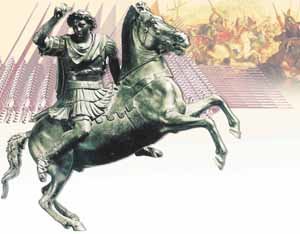World Is for Dreamers

"No time for waiting till the fever has left. The fever is to abate. I want to move forward."
He wanted to see the end of the world by all means. Did he, who had entertained death over eleven times, recognize that the mysterious fever is a messenger from the netherworld? He dreamed of a day when he would conquer Arabia, the land of `spice, aloe, and myrrh,` until the end of his life.
Days later on July 10th of 323 BCE, the great star fell in Babylon. He was 33 years old. He was a conqueror who had built a great empire expanding to India and Egypt within only 12 years, stimulating the spread of Hellenism, a hybrid of the East and West Cultures. He is Alexander the Great (356-323 BCE), who later became the ideal type of many with power including Caesar, Nero, Louis XIV, Napoleon, and Castro.
This book, which had a tremendous sale in Europe, is a heroic epic deliberately reviving Alexandros III known as Alexander. Every sing page is full of sandstorms in the vast expanse of Middle Eastern deserts and the shouts of victories in the sanguinary battles. However, if the book was only a tale of heroism, it would never have been sold over 10 million copies all over the world.
The attraction of this book is that Alexander is portrayed in this book as a person with various personalities, without being fossilized as a ruthless conqueror as generally known to us.
The author believes that Alexander`s devotion to ` thing greater than himself` is his fate as `a legitimate son of God`. Whether it is true or not, the point is in the fact that he believed it and committed his life to prove this fate and finally establishes himself as a protagonist of history. In this sense, Alexander is rather a demigod than an anthropomorphic figure.
However, Alexandros was not only a hero. His personality coexist both the virtue of Hercules who endures the suffering of hungry, coldness, and death, and the image of Dionysos who indulges in debauchery.
It is also noteworthy that a great leader does not stand alone. Chinese historian Sima Qian wrote that it is difficult to achieve even with the close friends who share many hardships together. But the friends of Alexander were different. While each of them was an `iron man` who could govern a state by himself, they all supported their leader with friendship and loyalty, sharing the happiness and sorrows together.
A reader reading through the long epic of a short but dramatic life of a hero may face a question. How much can human beings overcome their limits?
The answer lies in that human has power only as much as one can overcome oneself. A poem by William E. Henry, Invictus (1975), which praises the greatness of the spirit that never can be conquered, comes across.
I am the master of my fate
I am the captain of my soul
Alexandros. El Hijo Del Sueno (3 volumes)
A novel of Valerio Messimo Manfredi
Yun Jeong-Hoon digana@donga.com







